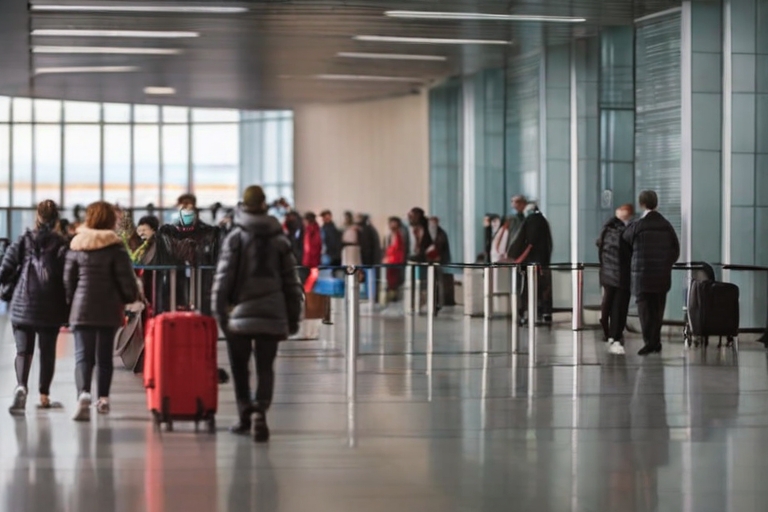Ottawa, Canada’s capital, is witnessing a significant cultural and demographic shift, thanks in part to the rise of Francophone immigration. This phenomenon is not just reshaping the city’s linguistic landscape but is also contributing to its economic and social fabric. The Canadian government’s strategic focus on welcoming Francophone immigrants, especially outside Quebec, has played a pivotal role in this transformation. This introduction explores recent trends in Francophone immigration to Ottawa, delving into government initiatives that facilitate this influx and the broader implications for the city.

In recent years, Ottawa has become an increasingly popular destination for French-speaking immigrants. This shift is part of a larger national strategy aimed at enhancing the vitality of Francophone minority communities across Canada. The Government of Canada, recognizing the importance of cultural and linguistic diversity, has set ambitious targets for Francophone immigration under its 2024-2026 Immigration Levels Plan. This plan outlines a progressive increase in the number of French-speaking permanent residents, aiming to welcome 31,500 individuals in 2025 and 36,000 by 2026.
The Canadian government’s commitment is further evidenced by its funding initiatives, such as the financial assistance provided to the Université de l’Ontario français. This funding supports the establishment of the Observatoire en immigration francophone au Canada, a project dedicated to enhancing understanding and directing efforts in Francophone immigration.
Moreover, the strategic report titled “An Immigration System for Canada’s Future” outlines the action plan for Francophone immigration. The report emphasizes the goal to heighten the vitality of Francophone minority communities and includes developing a Francophone Immigration Policy, boosting promotion and selection efforts, and supporting the settlement and integration of French-speaking immigrants.
The introduction of reforms in the Express Entry system, expansion of pathways for French speakers, and partnerships with provinces and territories further underline the multifaceted approach Canada is taking to foster Francophone immigration. These initiatives not only aim to increase the number of Francophone immigrants but also ensure their successful integration into Canadian society, with a special focus on communities outside Quebec like Ottawa.
The rise of Francophone immigration to Ottawa is a dynamic process, backed by a comprehensive government strategy. It’s a phenomenon that presents both challenges and opportunities, as the city adapts to a more diverse and multilingual environment. As we delve deeper into this topic, we will explore the economic and cultural impacts, the challenges of integration, the role of government policies, and the long-term implications for Ottawa’s society.
Economic and Cultural Impact: How Francophone Immigrants are Shaping Ottawa’s Future
Economic and Cultural Impact
The influx of Francophone immigrants in Ottawa is not just a demographic change; it’s a catalyst for economic growth and cultural enrichment. These immigrants bring with them diverse skills, experiences, and cultural perspectives that contribute significantly to the local economy and society.

Economic Contributions: Francophone immigrants are playing a crucial role in addressing labor shortages in various sectors in Ottawa. Their unique skills and qualifications help fill critical gaps, especially in bilingual positions, enhancing the city’s competitiveness and economic resilience. Additionally, these immigrants often bring entrepreneurial spirit, leading to the creation of new businesses and stimulating local economic development. This economic contribution is vital for Ottawa, as it positions the city as a multicultural and multilingual hub, attractive for both domestic and international investments.
Cultural Enrichment: Beyond economic contributions, Francophone immigrants enrich Ottawa’s cultural landscape. They bring a slice of Francophone culture, from culinary traditions to artistic expressions, adding to the city’s cultural diversity. Festivals, music, cuisine, and art from Francophone cultures are increasingly visible in Ottawa, fostering a vibrant and dynamic community life. This cultural diversity not only enhances the quality of life for residents but also makes Ottawa a more attractive destination for tourists and new residents.
Language and Education: The rise in Francophone population has also led to an increased demand for French-language services and education. Schools, public services, and businesses are adapting to this change, offering more services in French and hiring bilingual staff. This linguistic shift is not only beneficial for the Francophone community but also for the city at large, as it promotes bilingualism and enhances communication and understanding between different linguistic groups.
Community Integration and Interaction: As Francophone immigrants integrate into Ottawa’s social fabric, there’s a growing interaction between different cultural groups. This interaction fosters mutual understanding and respect, strengthening community bonds and social cohesion. The integration of Francophone immigrants encourages a more inclusive society, where diversity is celebrated and valued.
The economic and cultural impact of Francophone immigration in Ottawa is profound. These immigrants are not only filling essential roles in the economy but are also enhancing the city’s cultural and social landscape. As Ottawa continues to welcome Francophone immigrants, it’s essential to recognize and support their contributions, ensuring their successful integration and the continued prosperity of the city.
Challenges and Opportunities: Balancing Integration and Community Development
Balancing Integration and Community Development
The influx of Francophone immigrants in Ottawa presents a unique set of challenges and opportunities. As the city navigates these dynamics, it’s crucial to strike a balance between facilitating the integration of these new residents and ensuring the development of both the immigrant and local communities.
Language and Cultural Barriers: One of the primary challenges faced by Francophone immigrants is the language barrier, especially those who are not fluent in English. This can affect their employment prospects, social interactions, and access to services. Cultural differences may also pose challenges in terms of social integration and understanding local customs and norms. Addressing these barriers requires targeted language programs and cultural orientation initiatives.

Access to Services and Support: Ensuring that Francophone immigrants have access to essential services in French is critical for their successful integration. This includes healthcare, education, legal services, and social support systems. The expansion of French-language services in Ottawa is thus a crucial step towards accommodating the needs of this growing community.
Employment and Economic Integration: While Francophone immigrants bring valuable skills and experience, they often face challenges in finding employment commensurate with their qualifications. Recognition of foreign credentials and professional experience can be a significant barrier. Initiatives to facilitate credential recognition, provide job search support, and create networking opportunities are essential to help these immigrants fully participate in the local economy.
Community Engagement and Inclusivity: For successful integration, it’s important to encourage active engagement of Francophone immigrants in the local community. This includes participation in local events, volunteering, and interactions with other community groups. Fostering an inclusive environment where the contributions and cultures of Francophone immigrants are recognized and celebrated is key to building a cohesive community.
Opportunities for Local Development: The arrival of Francophone immigrants also presents opportunities for local development. They can drive innovation, bring new perspectives to local issues, and enhance the city’s cultural and linguistic diversity. Their presence can also open up new markets and business opportunities, particularly in sectors that require bilingual skills.
Collaborative Efforts for Integration: Successful integration is a collaborative effort, involving government agencies, local communities, and the immigrants themselves. Developing policies and programs that address the specific needs of Francophone immigrants while ensuring the involvement of the entire community is crucial.
In summary, while there are challenges in integrating Francophone immigrants into Ottawa’s social and economic fabric, these can be addressed through comprehensive and inclusive strategies. By focusing on language support, service accessibility, employment opportunities, community engagement, and collaborative efforts, Ottawa can harness the full potential of its growing Francophone population.
Government Policies and Support Systems: Facilitating Smooth Transition for Francophone Immigrants
Facilitating a Smooth Transition
The Canadian government and local authorities in Ottawa have implemented various policies and support systems aimed at facilitating the smooth transition of Francophone immigrants. These initiatives are crucial in ensuring that these new residents can integrate effectively into their new environment.
Development of Francophone Immigration Policy: The Canadian government is in the process of developing a comprehensive Francophone Immigration Policy. This policy aims to restore and increase the demographic weight of Francophone minority communities across Canada, including in Ottawa. It encompasses boosting promotion and selection efforts for French-speaking permanent residents (PRs) and supporting their settlement and integration.

Express Entry Reforms: Reforms in the Express Entry system, a significant pathway for skilled immigrants to obtain permanent residence in Canada, now include a Francophone lens. This allows for greater flexibility in selecting French-speaking and bilingual candidates, enhancing their chances of successfully immigrating to Canada.
Expansion of Temporary to Permanent Resident Pathways: There is an emphasis on expanding pathways from temporary to permanent residence for French-speaking international students and temporary foreign workers. This includes expanding existing programs and creating new pathways targeting specific trades or professions, facilitating the transition of these individuals to permanent residents.
Strengthening Partnerships with Provinces and Territories: The government is working to strengthen partnerships with provinces and territories, understanding their labor force needs for French-speaking and bilingual immigrants. This approach is aimed at developing more tailored immigration strategies to meet individual provincial and territorial needs, including those of Ottawa.
Financial Support for Integration Initiatives: The government has allocated significant funds to support the growth of official languages in Canada. This includes promoting and building recruitment support for Francophone immigration both domestically and abroad, and consolidating the Francophone integration pathway to make settlement and integration easier for newcomers.
Community-based Support Programs: Local initiatives in Ottawa, such as community centers and non-profit organizations, provide valuable support to Francophone immigrants. These include language classes, employment assistance, cultural orientation programs, and networking opportunities, all aimed at aiding their integration into the local community.
Educational and Language Services: The increase in Francophone population has led to a rise in demand for French-language services and education. Ottawa’s schools and public services are adapting to this demand by offering more services in French and employing bilingual staff, thus facilitating the integration of Francophone families into the local community.
The combination of national policies and local initiatives in Ottawa is instrumental in supporting the smooth transition of Francophone immigrants. These efforts not only help in addressing the challenges faced by these immigrants but also in leveraging their potential to contribute positively to the city’s economic and cultural landscape.
Looking Ahead: The Long-term Implications of Francophone Immigration on Ottawa’s Society
The Future Landscape of Ottawa
As Ottawa continues to welcome an increasing number of Francophone immigrants, it’s important to consider the long-term implications of this demographic shift on the city’s social, economic, and cultural landscape.
Enriched Cultural Diversity: One of the most visible impacts will be the enrichment of Ottawa’s cultural diversity. Francophone immigrants bring with them a wealth of cultural traditions, languages, and perspectives that contribute to a more vibrant and dynamic society. This diversity will not only enhance the city’s cultural fabric but also promote greater tolerance and understanding among different community groups.

Economic Growth and Innovation: Francophone immigrants, with their diverse skills and entrepreneurial spirit, are poised to play a significant role in driving Ottawa’s economic growth and innovation. Their participation in the workforce and the creation of new businesses can lead to economic diversification and resilience, making Ottawa an even more attractive destination for business and tourism.
Linguistic Evolution: The influx of French-speaking residents will further solidify Ottawa’s status as a bilingual city. This linguistic evolution can have far-reaching implications, including increased demand for bilingual services and education, and enhanced opportunities for all residents to learn and use both of Canada’s official languages.
Changes in Urban and Social Infrastructure: As the Francophone population grows, there may be changes in urban and social infrastructure to better accommodate their needs. This includes the expansion of French-language schools, healthcare facilities, and community centers, as well as adjustments in public services to ensure bilingual accessibility.
Influence on Policy and Governance: The growing presence and participation of Francophone immigrants in Ottawa can also influence local policy and governance. Their unique needs and perspectives may lead to new policies and initiatives that promote multiculturalism, bilingualism, and inclusive community development.
Strengthened International Ties: Finally, the presence of a significant Francophone community in Ottawa could strengthen Canada’s ties with Francophone countries around the world. This could open up new avenues for international collaboration, trade, and cultural exchange, further elevating Ottawa’s status on the global stage.
The long-term implications of Francophone immigration in Ottawa are multifaceted and largely positive. By embracing this demographic shift, Ottawa can look forward to a future that is economically robust, culturally diverse, and linguistically rich, setting a precedent for other cities in Canada and beyond.
